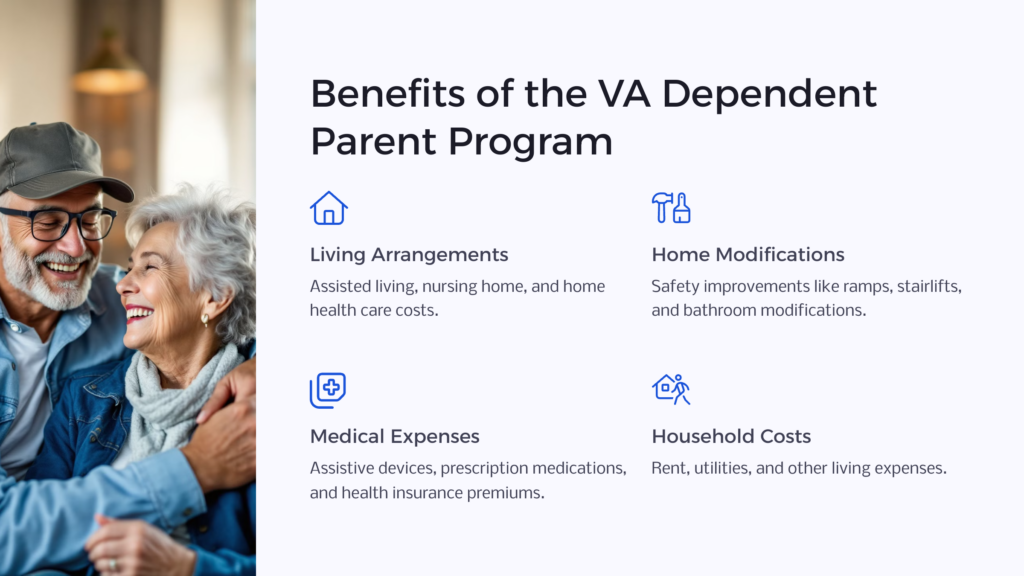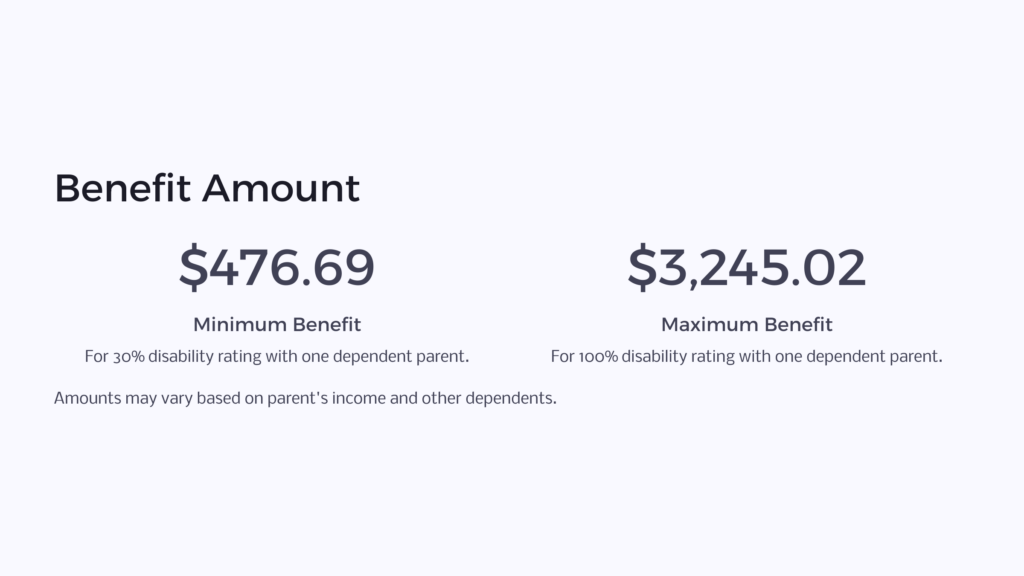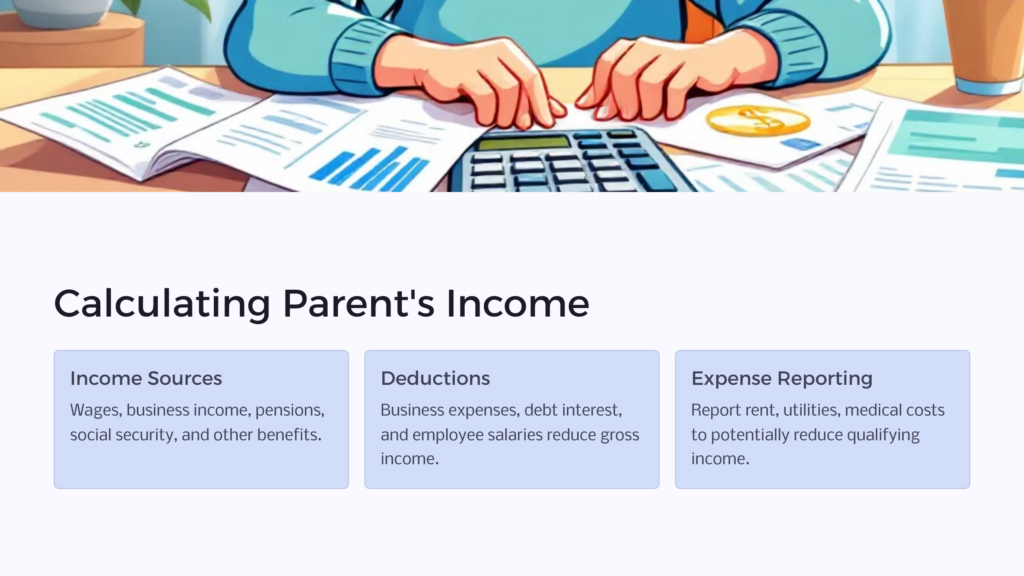As a military service veteran, you are entitled to specific benefits from the U.S. Department of Veterans Affairs. One of these is the dependent parent benefit, which provides you with cash assistance to help you care for a dependent parent in your household.
The dependent parent benefit helps veterans who collect VA disability with the extra expense that comes with the dependent care for an elderly parent living with or relying on their adult child for financial support. The VA assesses dependency by evaluating the parent’s financial contributions, income, expenses, and assets to determine if the parent is truly reliant on the veteran for their basic needs.
What Is the Dependent Parent Program?
The VA Dependent Parent Program is part of the VA disability compensation program. This program adds a cash benefit to your monthly veterans disability pay to help you cover the care costs and medical expenses of your dependent parent’s care. If approved for the Dependent Parent Benefit, the compensation is paid directly to the veteran and added to their existing disability compensation.
If you receive disability compensation for your time as an active duty military member and you have one or both parents who rely on you financially and for direct care, you may be eligible for an additional cash benefit to cover the expense related to your dependent parent.
Claiming a parent as a dependent can provide access to help with your parent’s healthcare, rent, home safety modifications, and other costs that could make it challenging for you to pay on your own. Eligible veterans can receive benefits to support their dependent parents, including financial assistance for their care.

To qualify for this VA compensation, you must have a service connected disability and receive VA disability compensation. The veteran can apply for a dependent parent benefit when applying for their disability compensation or after they’ve started receiving benefits or enrolled in educational benefits.
6 Benefits of the VA Dependent Parent Program
- Assisted living, nursing home, and other types of care
- Home safety modifications
- Assistive devices
- Prescription medication
- Health insurance premiums
- Rent, utilities, and other household costs

The list below consists of some of the more common ways in which you can spend the benefit. If your parent requires other types of care, you can speak with a veterans disability attorney or a Veterans Service Officer (VSO) to help you navigate acceptable expenses.
Assisted Living, Nursing Home, and Other Types of Care
One of the most helpful features of the VA dependent parent benefit is its ability to help the veteran receiving disability compensation pay for their dependent parent’s living needs. The monthly benefit can help you afford modifications that need to be made to your home to assist your parent, as well as pay towards nursing home care, home health care, and other assistive care.
Home Health Care
If your parent requires therapists and nurses to come to the home to provide services, you could use the VA dependent parent benefit to cover these services’ costs that health insurance might not cover.
- Home health care can include:
- Occupational therapy
- Physical therapy
- Speech therapy
- Diabetes monitoring
- Nursing care
- Wound care
- Education about their condition or health
In-Home Personal Care Assistance
In-home personal care is similar to home health care, but it focuses more on your parent’s daily personal needs, like bathing and dressing. In-home care can assist parents with daily activities such as bathing, dressing, and meal preparation, helping them maintain independence and quality of life.
A home care aide can help prepare meals, help your parent use the restroom, remind them to take their medication, or transport them back and forth to doctor’s appointments or the grocery store. In-home care helps take some of the stress of the adult child or other qualifying relative who is the primary caregiver.
Nursing Home Care
Parents who need more care than they can get at home might benefit from living in a nursing home. Nursing homes offer extensive care to residents, including administering medications, dressing, bathing, exercising, and feeding if necessary. A nursing home also provides routine nursing care and emergency services to residents.
Assisted Living
Assisted living allows a parent to live in more of a home setting but with the help of skilled nursing and medical care not far away. Some assisted living facilities offer individual apartments, while others have rooms with shared living spaces. They’re designed to give residents some independence while still having medical care an arm’s reach away.
Respite Care
If you’re the person who typically cares for your elderly parent financially and physically, you could benefit from some time off to use as self-care. Respite care can give you that, and your VA dependent parent funds could go toward paying a respite care provider to relieve the primary caregiver occasionally.
Home Safety Modifications
If you receive VA disability benefits with a VA dependent parent benefit, you could apply the funds toward safety modifications for your parent’s home or your home if your parent lives with you.
Home safety modifications can include, but aren’t limited to:
- Ramps
- Stairlifts
- Shower and bath modifications
- Widened doorways
- Medical alert systems
- Hoyer lifts
- Seating modifications
- Kitchen modifications for people in wheelchairs
- Lighting modifications
- Smart lighting and appliance controls
Assistive Devices
Your parent might require assistive devices to help them with everyday tasks. Hearing aids, for example, could allow them to hear and communicate better. A wheelchair or walker could enable them to move around their home more freely and safely.
Your VA dependents benefits can also help you pay for assistive devices like:
- Communication devices
- Mobility scooters
- Automatic door openers
- Cognitive software
- Feeding devices
- Dressing aids
- Prosthetic equipment
- Braille devices
- Electronic book readers
Prescription Medication
Health coverage for seniors sometimes doesn’t pay for prescription coverage or leaves seniors with high copays for their medications. If your parent faces this problem, you might consider using your benefit to help with medication costs each month.
Health Insurance Premiums
You can also pay for your parent’s health insurance premiums with your monthly benefit. This can be extremely helpful for offsetting the high costs often associated with senior health coverage.
Rent, Utilities, and Other Household Costs
Your VA dependent parent benefit doesn’t have to go toward medical costs, although that should be a priority. Suppose you have money left from the benefit after paying for health coverage, copays, assistive technology, and other medical costs for your parent. In that case, you can use it toward rent, utilities, and additional regular costs of living. Groceries, clothing, and entertainment are also acceptable expenses.
How Much Is the VA Dependent Parent Benefit?

The benefit amount you’ll receive for eligible dependents varies based on your parent’s income and your VA disability rating. The combined disability rating is a key factor in determining both eligibility and the amount of additional compensation you may receive.
For a rating of 30% to 60%, one dependent parent, and no spouse or children, you can receive a total of between $604.47 and $1,540.02 per month. A certain amount is added for each dependent, including spouses, and various factors such as your combined disability rating, dependency status, and number of dependents affect the total benefit.
The same circumstances for a 70% to 100% disability rating will give you between $1,931.45 and $4,114.82 per month.
Veteran Eligibility Requirements
A veteran can only have a qualifying dependent parent under two conditions. First, a parent can qualify as a dependent parent of military personnel when the veteran qualifies for VA disability pay. The veteran must meet the eligibility requirement for at least a 30% VA disability rating to add a dependent parent or any other type of dependent to their compensation. Financial dependency is determined by the parent’s income and must fall below specific thresholds, such as $400 per month for a single parent or $660 for both parents living together.
Otherwise, a veteran must be enrolled in an educational assistance military program on at least a part-time schedule for their parent to qualify. A veteran cannot have a dishonorable discharge to qualify for the program.
Parent Eligibility Requirements
To be an eligible parent to add as a dependent, the parent must be the biological, adoptive, foster, or step parent. This relationship should be established for at least one year before the servicemember enters active duty. The parent must also be under the veteran’s direct care and have an income and net worth that falls below the eligibility guidelines.
You can also add a dependent parent after they’ve become a dependent of yours while receiving disability compensation with at least a 30% disability rating or while receiving educational assistance. Veterans can apply for Dependent Parent Benefits any time after their initial disability claim has been processed.
Financial Eligibility Requirements
The VA considers the dependent parent’s countable income only to approve or deny a claim for dependent parent disability benefits. When determining eligibility, the VA allows certain deductions, such as uncovered medical bills, which can be subtracted from income to lower the countable income.
When you apply, you’ll need to include all income for your dependent parent for the past 12 calendar months from your application date. You’ll also need to note the sources of your parent’s income, as well as disclose all assets, resources, and the total value of these. Other resources such as savings, investments, and property are also considered and must be reported.

What Is Included in a Parent’s Net Worth and Income?
A parent’s income can include any of the following:
- Wages or salary
- Business income
- Pension income
- Money from dividends or interest
- Social security benefits, retirement pay, disability pay, etc.
- Money given to the parent by friends or family
- Insurance benefits
The VA considers only the parent’s net income for money that comes from a business or other types of income that is subject to expenses. In this case, specific expenses count as a deduction from your parent’s income to provide their gross income, including business expenses, business debt interest, and other employees’ salaries.
The VA also considers a parent’s net worth based on things they might own, like real estate, savings accounts, and stocks. However, you do not need to report the parent’s home, vehicle, clothing, and other personal property with your claim.
Are There Ways to Reduce Qualifying Income?
Yes. You can detail specific expenses for your parent when you apply for the dependent parent benefit. Note expenses like rent or mortgage payments, utility payments, clothing expenses, taxes, home repair or maintenance costs, and other payments your parent makes. You can also let the VA know how much your parent’s medical expenses cost. Report all expenses for the past 12 calendar months before the date of your application.
How to Apply for the VA Dependent Parent Benefit
As a claimant filing a claim for the VA dependent parent benefit, you must complete and submit VA FORM 21P-509. Submit the completed form with your VA disability claim as part of your original claim, or file it as a separate filing if your parent becomes dependent after your initial application.
Necessary documents for applying for VA benefits include the veteran’s military discharge papers, proof of relationship, and financial information for income-based benefits. You can also file the form if you’re receiving educational assistance. Parents can also file claims for their child who is a deceased veteran using the same form.
VA Benefits and Support for Veterans
The VA provides support to veterans and their families through various programs, like CHAMPVA, VA loans, educational benefit programs, surviving spouse or surviving child benefits, and Dependency and Indemnity Compensation (DIC) for eligible family members.
The VA dependent parent program is just another way the VA ensures that a veteran can take care of their family.
Claiming a parent as a dependent makes it possible for you to support your parent who depends on you financially. Your benefit can pay for health coverage, assistive technology, and care for your dependent parent.
 Benefits.com Advisors
Benefits.com Advisors
With expertise spanning local, state, and federal benefit programs, our team is dedicated to guiding individuals towards the perfect program tailored to their unique circumstances.
Rise to the top with Peak Benefits!
Join our Peak Benefits Newsletter for the latest news, resources, and offers on all things government benefits.




















